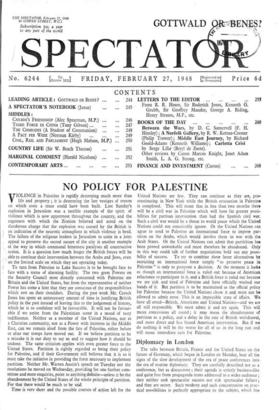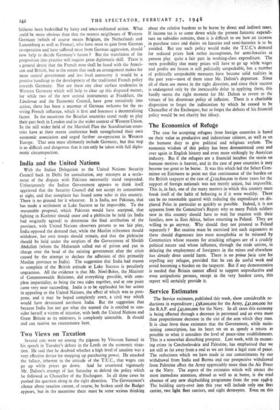Diplomacy in London
The talks between Britain, France and the United States on the future of Germany, which began in London on Monday, bear all the signs of the slow development of the era of peace conferences into the era of routine diplomacy. They are carefully described not as a conference, but as discussions ; their agenda is strictly business-like and quite free from propaganda items addressed to a wider audience ; they neither seek spectacular success nor risk spectacular failure ; and they are secret. Such modesty and such concentration on prac- tical possibilities is perfectly appropriate to the subject, which has hitherto been bedevilled by hasty and unco-ordinated action. What could be more obvious than that the nearest neighbours of Western Germany (which of course means Belgium, the Netherlands and Luxemburg as well as France), who have most to gain from German co-operation and have suffered most from German aggression, should now help to decide Germany's future ? But the translation of the proposition into practice will require great diplomatic skill. There is a general desire that the French zone shall be fused with the Ameri- can and British, but to the extent that such an arrangement makes for more central government and less local autonomy it would be a positive handicap to the development of the traditional French policy towards Germany. Nor are there any clear surface tendencies in Western Germany which will help to clear up this disputed matter, for while two of the new central instruments at Frankfurt, the Liinderrat and the Economic Council, have gone tentatively into action, there has been a murmur of German welcome for the re- viving French influence, which is first and foremost a decentralising factor. In the meantime the Benelux countries stand ready to play their part both in London and in the wider context of Western Union. In the still wider field of the Marshall Plan the Scandinavian coun- tries have at their recent conference both strengthened their own economic association and urged further co-operation in Western Europe. That area must ultimately include Germany, but that step is so difficult and dangerous that it can only be taken with full diplo- matic circumspection.



































 Previous page
Previous page